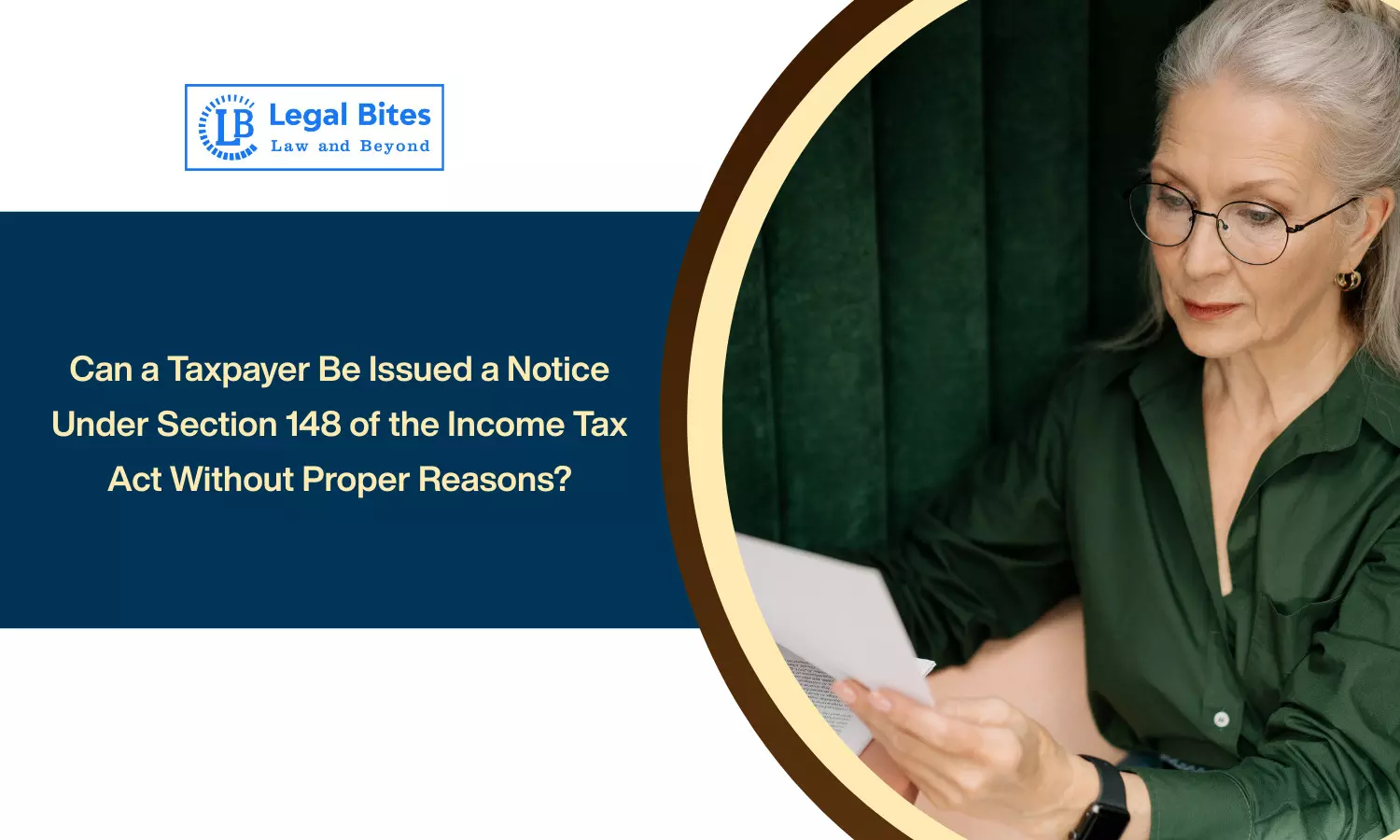
Section 148 of the Income Tax Act, 1961 empowers the Assessing Officer (AO) to issue a notice to a taxpayer if income chargeable to tax has escaped assessment. However, with the incorporation of Section 148A through the Finance Act, 2021, a more structured process has been introduced, which mandates the AO to conduct an inquiry and provide an opportunity to be heard before issuing a notice under Section 148.
The recent decision of the Himachal Pradesh High Court in Neena Singh Thakur v. Pr. Commissioner of Income Tax (2025) has brought much-needed clarity on the strict requirement of reasoned decision-making in such proceedings.
Legal Framework: Sections 147 and 148 of the Income Tax Act
Section 147 – Income Escaping Assessment
Section 147 empowers the Assessing Officer (AO) to assess or reassess income that has escaped assessment for any assessment year. However, such power is contingent upon the AO possessing “reason to believe” that income has escaped assessment.
Section 148 – Issue of Notice
Section 148 is the procedural follow-up to Section 147. It mandates the issuance of a notice to the assessee before reopening the case. However, since the Finance Act, 2021, a preliminary procedure under Section 148A has been introduced to safeguard taxpayers’ rights and ensure that notices are not issued arbitrarily.
Section 148A: The Protective Shield
Section 148A requires:
- Conducting an inquiry (if required) with prior approval.
- Providing the assessee an opportunity to be heard.
- Considering the reply of the assessee.
- Passing a reasoned order under Section 148A(d).
Only if this order deems that income has indeed escaped assessment can a notice under Section 148 be issued.
Facts of the Case: Neena Singh Thakur v. Pr. Commissioner of Income Tax
In this case, the petitioner, Neena Singh Thakur, was issued a notice under Section 148 based on an alleged purchase of immovable property worth ₹1.21 crore and interest income of ₹35,109/- that was allegedly not disclosed in her return for Assessment Year 2017–18. The AO claimed that this constituted “escaped income” and initiated reassessment proceedings.
The petitioner contested the notice under Section 148A, submitting documents clarifying the source of funds and asserting that the transaction was disclosed. Despite a detailed reply, the AO issued the reassessment notice under Section 148 without providing any cogent reasons.
High Court’s Observations
The Division Bench, comprising Justice Tarlok Singh Chauhan and Justice Sushil Kukreja, emphatically held that:
“The Assessing Officer cannot shirk away from his responsibility of deciding the case on the material available on record… reasons for the same have to be recorded in the order itself.”
Key Points from the Judgment
1) No Mechanical Issuance of Notice:
The Court made it clear that issuing a notice under Section 148 cannot be a routine or mechanical exercise. There must be a reasoned conclusion backed by the evidence provided and examined under Section 148A.
2) Requirement of Recording Reasons:
The AO failed to state how or why the transactions amounted to escaped income exceeding ₹50 lakhs. The High Court ruled this as a denial of justice, noting that:
“Failure to give reasons amounts to denial of justice.”
3) Protection from Arbitrary Action:
The Court referred to the landmark judgment in Kranti Associates Pvt. Ltd. v. Masood Ahmed Khan [(2010) 9 SCC 496], which held that reasons are indispensable in any quasi-judicial or administrative decision affecting rights.
4) Judicial Precedents Supporting Reasoned Orders
The Court relied on several precedents, including:
- S.N. Mukherjee v. Union of India [(1990) 4 SCC 594]
- Ravi Yashwant Bhoir v. District Collector, Raigad [(2012) 4 SCC 407]
- Krishna Swami v. Union of India [(1992) 4 SCC 605]
5) Right to Reason as Part of Natural Justice
The Bench reaffirmed that the right to know the reasons behind a decision is a fundamental element of fair procedure under Articles 14 and 21 of the Constitution.
Implications of the Judgment
1. Strengthens Taxpayer Rights
The ruling ensures that taxpayers are not subjected to arbitrary reassessment proceedings. It recognises the significance of procedural compliance and due process.
2. AO’s Duty to Apply Mind
The AO must objectively examine the taxpayer’s explanation and supporting documents and then record clear, cogent, and justifiable reasons for initiating reassessment.
3. Need for Proportionality
The judgment suggests that even if income has escaped assessment, the threshold (e.g., over ₹50 lakhs) must be demonstrably crossed with supportive reasoning, not assumptions.
4. Judicial Review Becomes Feasible
Reasoned orders are subject to meaningful judicial review. Without them, courts cannot assess whether the AO exercised discretion lawfully.
Conclusion
The Himachal Pradesh High Court’s decision in Neena Singh Thakur reiterates the sanctity of due process in tax administration. Section 148A is not a procedural formality but a critical safeguard to ensure that a taxpayer is not harassed without just cause. A notice under Section 148 cannot be issued on vague or unsubstantiated grounds; it must be preceded by a reasoned and evidence-based order under Section 148A(d).
This ruling sends a strong message to tax authorities: reassessment is not a tool for fishing expeditions. It must be deployed with caution, precision, and a deep respect for the taxpayer’s right to a fair hearing and reasoned decision.
Important Link